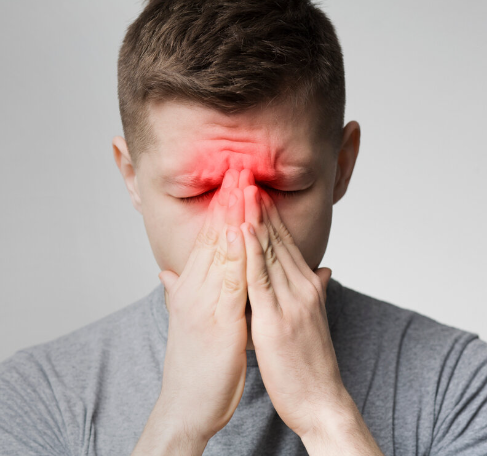Sinusitis

Understanding Sinusitis: Causes, Symptoms, and Treatments
Introduction
Sinusitis, also known as a sinus infection, occurs when the tissues lining the sinuses (the hollow spaces in the bones around the nose) become inflamed or swollen. This can lead to blocked sinuses, trapping mucus and causing pain or discomfort. Sinusitis can be acute, lasting a few days to weeks, or chronic, lasting for months or recurring frequently.
Causes of Sinusitis
- Viral Infections:
- The most common cause of acute sinusitis is a viral infection, such as a cold or flu, which leads to inflammation and blockage of the sinuses.
- Bacterial Infections:
- In some cases, bacterial infections may develop if the sinus blockage persists, leading to more severe symptoms.
- Allergies (Allergic Rhinitis):
- Allergic reactions to pollen, dust, pet dander, or mold can cause sinus inflammation and contribute to sinusitis.
- Nasal Polyps:
- These are growths in the nasal cavity that can block the sinuses and cause chronic sinusitis.
- Deviated Nasal Septum:
- A crooked or off-center nasal septum can block the nasal passages, making it more likely for sinus infections to occur.
- Environmental Irritants:
- Exposure to pollutants, smoke, or chemicals can irritate the sinus passages and lead to inflammation.
Symptoms of Sinusitis
- Nasal Congestion: Difficulty breathing through the nose due to blocked or inflamed nasal passages.
- Thick Nasal Discharge: Yellow or green mucus may drain from the nose or down the back of the throat (postnasal drip).
- Facial Pain or Pressure: Tenderness and pressure around the eyes, cheeks, nose, or forehead.
- Headache: Sinus pressure can cause headaches, especially in the forehead and behind the eyes.
- Loss of Smell or Taste: Reduced ability to smell or taste food.
- Cough: Often worse at night, due to postnasal drip.
- Fatigue: Feeling tired or rundown, especially with chronic sinusitis.
- Sore Throat or Bad Breath: Postnasal drip can irritate the throat and cause bad breath.
Home Remedies for Sinusitis
- Nasal Irrigation (Saline Rinse):
- Using a neti pot or saline spray to flush out the nasal passages can help reduce congestion and clear mucus.
- Steam Inhalation:
- Inhaling steam from a bowl of hot water or a warm shower can help open the sinuses and relieve congestion.
- Warm Compresses:
- Applying a warm compress to the face can reduce sinus pain and pressure.
- Stay Hydrated:
- Drinking plenty of water helps thin mucus, making it easier to drain from the sinuses.
- Humidifier:
- Adding moisture to the air with a humidifier can prevent the nasal passages from becoming too dry and help with sinus drainage.
- Over-the-Counter Decongestants:
- Decongestant sprays or tablets can help reduce nasal swelling, but should be used sparingly to avoid rebound congestion.
Clinical Treatments for Sinusitis
- Antibiotics:
- If bacterial sinusitis is suspected, a doctor may prescribe antibiotics. However, antibiotics are not effective for viral infections.
- Corticosteroid Nasal Sprays:
- Prescription sprays can reduce inflammation and are particularly helpful for chronic sinusitis or sinusitis caused by allergies.
- Allergy Medications:
- Antihistamines or allergy shots may be prescribed to control allergic rhinitis and prevent sinusitis.
- Surgery:
- In cases of chronic sinusitis caused by nasal polyps or a deviated septum, surgery may be needed to correct the issue and improve drainage.
- Sinus Balloon Dilation:
- A minimally invasive procedure where a small balloon is inserted into the sinus cavity and inflated to open up the sinus passage, improving airflow and drainage.
Alternative/Non-Invasive Treatments for Sinusitis
For sinusitis, the therapies offered by Earl Claytont Wellness Centre that may help alleviate symptoms and support overall recovery include:
- PEMF (Pulsed Electromagnetic Field Therapy):
- PEMF therapy can help reduce inflammation, improve circulation, and promote healing in the sinus region. It may alleviate sinus congestion and pressure, which are common symptoms of sinusitis.
- Full Spectrum Infrared Sauna:
- Infrared sauna therapy promotes detoxification and improves circulation, which may help reduce sinus inflammation and open nasal passages. The warmth can also soothe sinus pressure and help drain mucus buildup.
- Vitamin B Complex:
- B vitamins, particularly B12 and B6, support immune function and overall energy levels. A B Complex supplement can boost the body’s natural defenses, helping to fight off infections and support recovery from sinusitis.
- NAD+ Therapy:
- NAD+ therapy can enhance the body’s immune response and promote cellular repair, which may help speed recovery from sinus infections and reduce inflammation in the sinuses.
These therapies may help relieve sinusitis symptoms by reducing inflammation, supporting the immune system, and promoting overall healing. However, for bacterial sinus infections, medical treatments like antibiotics may be necessary.
Discover the perfect treatment for you with a FREE MEDICAL ASSESSMENT! Limited slots available – secure yours now by scheduling an appointment. Click below to book now!
When to Seek Medical Attention
- Persistent Symptoms: If symptoms last longer than 10 days or worsen, especially with a fever, it may be a sign of bacterial sinusitis that needs medical treatment.
- Severe Headaches or Swelling: If you experience severe headaches, facial swelling, or vision changes, seek medical attention immediately.
Conclusion
Sinusitis is a common condition that can cause significant discomfort but is often treatable with home remedies and medications. For persistent or chronic cases, medical treatment may be necessary to address the underlying cause and provide relief. Regular care and managing allergies or irritants can help prevent future sinus infections.

